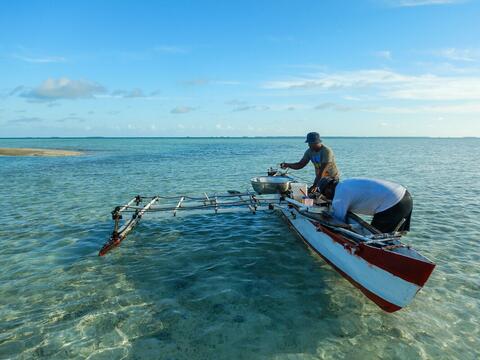Strengthening regional knowledge of coastal habitats through effective scientific monitoring to ensure sustainable benefits for coastal communities
Fisheries and aquaculture play a significant role in the economies, food security, and livelihoods of Pacific Island countries and territories (PICTs). Coastal communities catch marine resources for subsistence as well as to sell, while industrial fishing, processing, and aquaculture also provide jobs and income to a vast number of households. However, population increases, and climate change are threatening coastal habitats as never before, compromising the long-term viability of the associated resources. Protecting the coastal ecosystems that support these communities is vital if PICTs are to achieve their sustainable development goals.

A key part of effectively managing and protecting coastal ecosystems and the communities they support is understanding how environmental parameters influence stocks and their associated habitats. Looking at the changes in patterns of key marine species in specific areas over time can help us to develop management strategies to protect the benefits that communities derive from their fisheries. The coral reefs of the Pacific are rich yet delicate ecosystems, especially vulnerable to increases in sea temperatures that are a key effect of climate change. Hence another vitally important aspect of monitoring changes over time is to better understand and distinguish climate change effects from other changes. This work can be challenging, especially as it requires a vast amount of scientifically rigorous data to be collected in a regionally standardised way. Fortunately, our coastal fisheries and aquaculture programme’s (CFAP) science and database teams are dedicated to providing the appropriate tools and training for such an approach.
As well as environmental monitoring, our team provides training and assistance with biological monitoring of commercially harvested reef fish and other invertebrate species of interest. Market and creel surveys are allied with life-history data from individual species to help evaluate the health and sustainability of targeted species in any given area or region.
SPC FAME’s work in coastal fisheries ecosystems aims to provide coastal fisheries agencies in the PICTs with the most updated advice on the status of their stocks. To deliver on this outcome our coastal fisheries science team are constantly developing and testing new methods and approaches to better understand ecosystem dynamics and to identify indicators of change. This work is complemented by our continuous program of training and knowledge building workshops which increases capacity in the region to enable member countries to fill essential scientific gaps in knowledge themselves. We work in partnership with our members to monitor and assess the health and sustainability of the region’s coastal fisheries and their associated habitats, in order to ensure a future for those communities whose way of life is so intrinsically linked to the sea.
